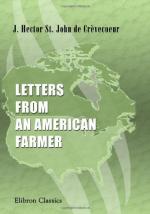|
This section contains 2,147 words (approx. 8 pages at 300 words per page) |

|
SOURCE: “The Aestheticism of Crèvecoeur's American Farmer,” in Early American Literature, Vol. 12, No. 2, Fall, 1977, pp. 197-201.
In the following essay, Kulungian examines Farmer James's aesthetic sensibilities, which are based solely on sentiment, in an effort to better understand Crèvecoeur's Letters from an American Farmer.
The colonial writer famous for first formulating the “melting-pot” interpretation of America, St. John de Crèvecoeur, was, like many sons of the European Enlightenment, a many-sided man. In his famous Letters from an American Farmer (1782) he evinces his aptitude for “speculative inquiries” such as history, economics, philosophy, anthropology, and political science. Underlying this varied range of intellectual curiosity about the world around him, the mind of Crèvecoeur, his essential temper, was fundamentally aesthetic and contemplative.
In the Letters Crèvecoeur speaks through the persona of Farmer James, a naive and native-born American of English descent. This fiction was essential if...
|
This section contains 2,147 words (approx. 8 pages at 300 words per page) |

|


